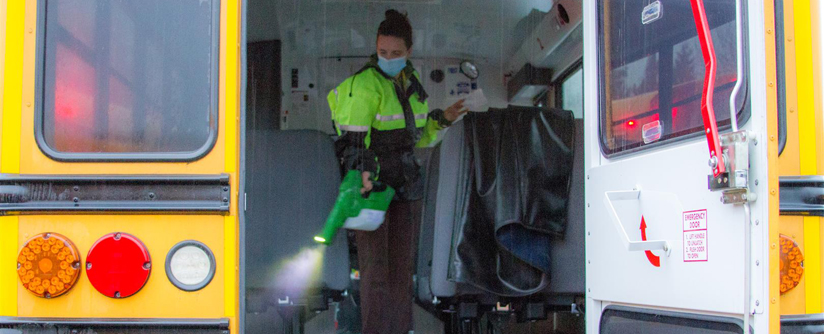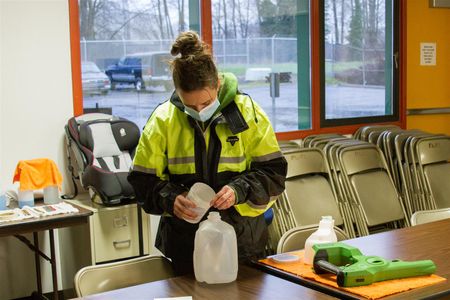Monday, January 4, 2021

KWRL, the transportation cooperative which operates the bus systems for Kalama, Woodland, Ridgefield, and La Center school districts, uses technology, deep cleaning and new rules to sanitize every bus each day and to safely transport students to and from school.
In order to sanitize each bus, KWRL uses special electrostatic fogging sprayers which evaporate and spray a special cleaning solution that cleans every surface of each bus. Thanks to the innovative design and technique of the sprayers, the cleaning fog even reaches the underside of bus seats so staff members can sanitize the entire student seating area effectively and efficiently.
In addition to the electrostatic spray, drivers thoroughly disinfect the high touch points on their bus such as handrails, driver seats, steering wheels, and driver controls after each route. “Our approach to everything had to change when the pandemic started,” said KWRL Transportation Director Shannon Barnett. “We purchased the equipment for deep cleaning the instant COVID-19 hit so we could prepare for what might come our way.”
 Mary Martin, a KWRL driver, mixes the cleaning solution used in the electrostatic sprayers
Mary Martin, a KWRL driver, mixes the cleaning solution used in the electrostatic sprayers
Mary Martin, one of KWRL’s drivers, volunteered to take on the extra work of disinfecting buses at the end of each day, mixing the special cleaning solution and fogging each bus with the electrostatic sprayers. “Fortunately, the efficiency of the sprayers means I can fully sanitize each bus quickly,” she said. “I can sanitize 25-30 buses in about half an hour.” Martin says she enjoys the time she spends sanitizing the bus fleet, “It’s actually a welcome activity after sitting and driving a route.”
As well as cleaning, KWRL introduced new rules for students to stay safe such as wearing masks, keeping windows partially open for improved airflow, and no longer being permitted to bring food or beverages on the bus. “Eating and drinking requires the removal of masks and also encourages sharing,” explained Barnett. “Fortunately, all the students and families completely understand so we haven’t had any pushback on the new rules.”
Drivers must also keep detailed seating charts to know which students rode the bus and where they sat that day. “In order to be able to contact-trace if a student comes down with COVID-19, we need to know exactly where they sat and who may have been exposed,” said Barnett. “Coming up with a method to accurately and quickly document ridership was a significant undertaking.”
Fortunately, KWRL already started transitioning its entire system to paperless digital recordkeeping before the pandemic hit, a project which the cooperative completed in December. “All of our drivers use portable computer tablets to log their routes, track passengers, perform health attestations, and check their work email,” said Barnett. “Going paperless has dramatically improved efficiency – we save dozens of work hours spent of data entry time each week when staff had to transpose our drivers’ written notes into our computer databases plus going digital removed any errors from difficult-to-read handwriting or ink smudges.”
Bus drivers also use the tablets to submit maintenance requests directly to the mechanic staff. “The result is nearly instantaneous response between a driver identifying a maintenance need and a mechanic scheduling the vehicle for repair,” said Barnett. “The tablets also make it easy for drivers to track tasks – whether it’s picking up passengers or delivering meals.”
Scheduling bus routes during the pandemic presented another enormous challenge with hybrid learning schedules and other school programs requiring transportation for different groups of students each day. “In addition to in-person learning, each district has a variety of special programs where students need to attend such as tutoring, small group learning, and more,” said Barnett. “All four of the school districts we serve collaborate with one another and us to help streamline schedules and bus routes so we have enough buses to serve the specific needs of each district.”
Thanks to the transition to digital, KWRL can make changes to bus routes and schedules nearly immediately. “If we change a bus stop time, the system automatically updates the website, sends out messages to affected families, and even updates the driver’s electronic route card on their tablet,” said Barnett. “Previously, we performed each of these tasks individually, but now it’s completely automated.”
KWRL’s specially designed system was developed by Steve Rippl, Woodland Public Schools’ Director of Information Technology, and his staff. “Steve is second-to-none when it comes to his dedication and skill in developing this customized software for KWRL,” said Barnett. “In fact, OSPI and ESDs around the state have asked to see our timecard system because they were fascinated with what our IT team built for us.”
The time freed up thanks to the digital transition also means improved customer service for students and families. “We shifted the hours spent entering data to reviewing routes in order to ensure we’re operating as efficiently and on-time as possible,” said Barnett. “Now, if a bus arrives at a bus stop late consistently, we can catch that right away and fix it, whereas, previously, we only had time to perform route audits on a periodic basis.”
Barnett commends his staff for going the extra mile to make sure students can go to and from school as well as have meal delivery during the pandemic. “We have a very dedicated group of drivers and have seen excellent participation from each of them during this time,” he said. “We are truly blessed to have such outstanding staff.”